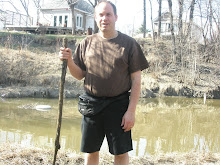
The Asexuals got me kicked out of Wellington’s, one of Winnipeg’s sleaziest bars. I was sixteen and my brother-in-law lied for me but to no avail. So I bought their L.P., Be What you Want, and spent the next six months just listening.
Like me; the Asexuals’ John Kastner came to the (North) American hardcore party a tad late. By 1984 the movement was splintering. As a result the rather conservative Asexuals adopted an ultra-clean sound dominated by a metallic but tinny guitars, sing-along choruses, forced tempos and ill-considered socio-political lyrics. Perhaps, it was kind of a punk-lite sound like the one that NOFX and one-hundred thousand other Fat Wreck-Chords tainted bands would bleed dry well into the next millennium. However, the Asexuals made something of it all.
Their first single (get it here), from1984, was on Og Records (discussed ad nauseum here at MRML). Be What you Want (get it here), came out later that year and got good notices from places like Maximumrocknroll.
By the time I got past the hairless and tattooed behemoth that guarded the door at Smellington’s and actually got to see the Asexuals tear up the stage, they’d moved towards a more mid-tempo Husker Dü sound. In fact, I taped Husker Dü’s Candy Apple Grey and Contemporary World onto a cassette back-to-back and they mixed well. The album still trades in speedy, catchy vaguely-political punk songs like “Where Were You” and “Stop the City” but Kastner was hitting upon the sound that he’d soon hone.
To Be Continued!

Download Contemporary World

Speaking of vague politics, let us pause to remember Bob Dylan’s anthem of generational revolt, “The Time s They Are-A-Changin’”, a song that in the master’s own hands has changed its meaning many times. In the scabrous early 80’s HxCx milieu that the Asexuals inhabited the song, despite its quasi-biblical language, became another “one-two-fuck-you” sorta song. I have my doubts the teenage Asexuals even listened to Dylan’s original before they recorded the version for Contemporary World (Modern Times anyone?). Their blueprint was clearly the version by The Wanderers, a band comprised of ¾ of Britain’s Sham 69 and ¼ of Cleveland, USA’s the Dead Boys (that 25% being front man, Stiv Bators). Despite their pedigree, the band's sole album sunk without a trace, rendering it a less than wildly influential work. Nonetheless, minus the jarring use of a string section, the Wanderers' basic arrangement (especially those backing vocals!) was clearly stolen wholesale by the Asexuals. Brazen musical theft? There’s a crime Bob himself would understand well.
The Wanderers - “The Time s They Are-A-Changin’”
The Asexuals - “The Time s They Are-A-Changin’”





































































